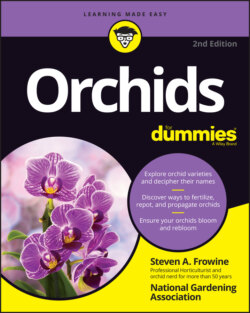Читать книгу Orchids For Dummies - The Editors of the National Gardening Association, Steven A. Frowine - Страница 19
WHY CARE THAT AN ORCHID WAS AWARDED?
ОглавлениеAwarded orchids are the crème de la crème of the orchid world. They’ve been deemed this distinction by trained, discriminating orchid judges. The American Orchid Society, a nonprofit educational organization that is dedicated to the study of orchids, has established the judging criteria. Similar organizations serve the same function in other parts of the world.
At each accredited orchid show, a covey of judges carefully examines orchids that are exceptional. They use Internet connections to check all existing records of the orchids being judged. They look for ones of the same grex or similar parentage to see what has been awarded in the past to serve as a benchmark of excellence. These records will reveal which of their parents have been awarded, what size and number of flowers were on the awarded plants, and so on. They then use the criteria to decide if these specimens are indeed superior to others of this type and whether they’re worthy of awards. The three award categories used by the American Orchid Society that you’re most likely to encounter are (from highest to lowest):
First Class Certificate (FCC): This is the coveted highest award that only a handful of orchids (10 or 15!) receive every year.
Award of Merit (AM): Usually a few hundred orchids win this distinction every year.
Highly Commended Certificate (HCC): Another few hundred orchids are given this level of award.Of course, other countries also have their own award designations, and these award-winning plants are equally exceptional and worth searching out.
Very few orchids make it through this gauntlet. Because of modern cloning techniques (see Chapter 2), you can now obtain these prize winners for your own collection at very reasonable prices. Some types of orchids, like the slippers, are rarely cloned, so in that case, picking out those hybrids with awarded parents is a good idea. Remember: It takes the same amount of space to grow a high-quality orchid as it does a poor one, so why not grow the best?
Orchid hybridizing can produce plants with quite complex names, especially in some of the exceptionally large groups like the cattleyas (see Chapter 11) and the oncidiums (see Chapter 13). In these chapters, I deal with their names in more detail. Appendix A provides a pronunciation key of many of the orchids I discuss in this book.
You don’t have to be an expert in orchid names in order to enjoy and grow orchids. You’ll catch onto many other name nuances after you’re drawn further into the orchid web. For now, don’t worry about them much — they’re only names!
